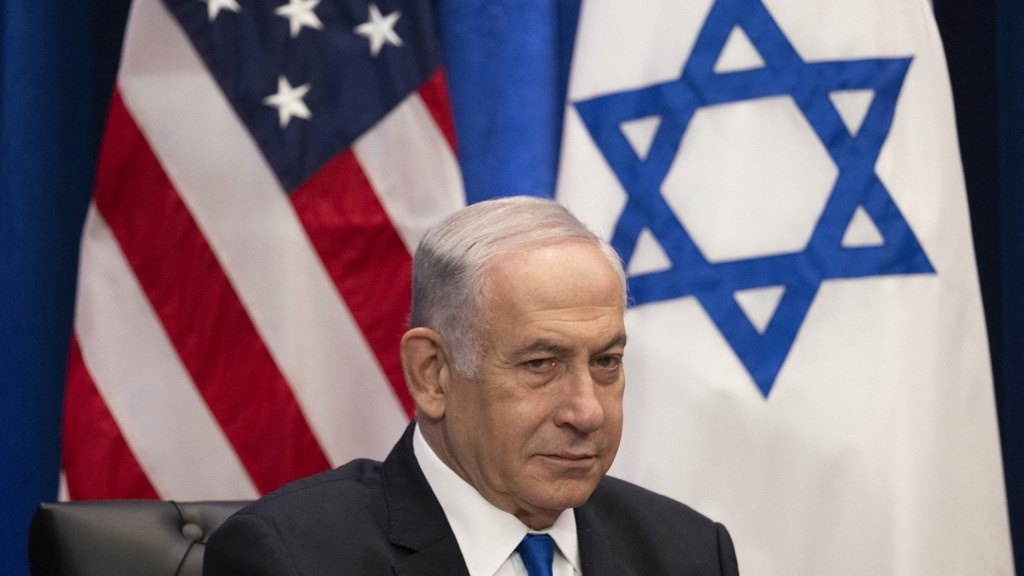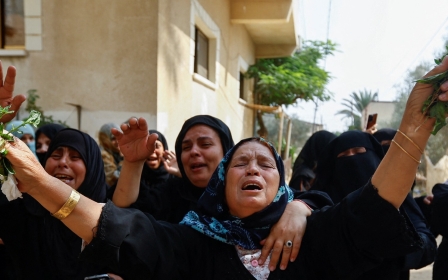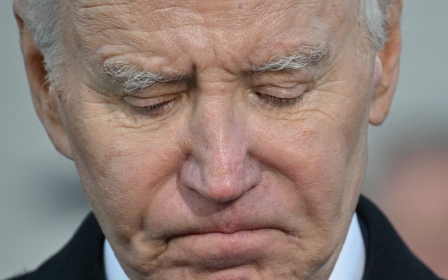The West will pay a heavy price for expending its credibility on Israel

Israeli occupation is not limited to Palestine. The response from western elites to Israel’s ongoing massacre in Gaza shows how Tel Aviv is also occupying the mindsets of American and European leaders.
Beyond setting up colonies on Palestinian lands, Israel has gone further, establishing political settlements in western capitals.
These moves have met an unprecedented lack of opposition, with politicians from across the spectrum uniting in support of Israel after the 7 October Hamas attack. There is a stark contrast between their impassioned speeches on Russia's invasion of Ukraine, and their detached, fanatical rhetoric on Israel.
Within international institutions, we have seen the West veto resolutions on basic humanitarian aid, severely damaging any claims to moral authority.
Such developments can be understood only through the lens of Israel’s enduring influence in the US and Europe. Tel Aviv’s influence on Middle Eastern governments is also clear, as they have mirrored its policies when confronted with the “threat” of democracy at home.
New MEE newsletter: Jerusalem Dispatch
Sign up to get the latest insights and analysis on Israel-Palestine, alongside Turkey Unpacked and other MEE newsletters
Israeli Prime Minister Benjamin Netanyahu encapsulated the situation aptly when he said last month: “To the leaders of the Arab states, leaders who worry about the future of their countries and of the Middle East, I say one thing: You must come out against Hamas … I am convinced that many Arab leaders understand this.” Clearly, they do.
For the past month, as millions of people around the globe have protested against the Gaza onslaught, the tragedy has evolved into a genocide. The ongoing protests serve as a stark revelation of the disconnect between western publics and their leaderships.
Indifference and silence
In this tumultuous landscape, US President Joe Biden’s pronouncements echo Russian President Vladimir Putin’s rationale for invading Ukraine. This stance is supported by European ministers who seem unable to see the parallel with Russia's actions, while Middle Eastern leaders' meek response resembles Israel’s attitude towards other atrocities around the world.
Amid escalating global political and economic tensions, and as alliance maps undergo a transformative shift, the West is grappling with the reality that its influence is plummeting. This will have substantial consequences in the years ahead.
Follow Middle East Eye's live coverage for the latest on the Israel-Palestine war
In an era marked by the erosion of democracy, the rise of populism, the crumbling relationship between human rights and prosperity, and a grave crisis in geopolitical coherence, the West will pay a significant cost for so freely expending its credibility on Israel.
A sustainable peace in Gaza, the occupied West Bank, or the broader region is impossible until Israel recognises Palestinians’ right to exist
But the question remains: can western political leaders and mainstream media dare to stray beyond the confines dictated by Israel in defining its narrative on the occupation of Palestine and the Gaza massacre? More crucially, as protests swell and public support for Israel plummets, has the western endorsement of Tel Aviv become an indictment?
This crisis transcends hypocrisy and double standards. Unless the West extricates itself from Israeli occupation and redirects its interests towards the rules-based international order, the crisis will only intensify. This situation jeopardises the delicate global stability that emerged after World War Two.
In a narrative reminiscent of Jose Saramago’s Blindness, it appears that on 7 October, western political elites abruptly and simultaneously lost their sight. They have since insisted that the rest of the world refrain from witnessing what they themselves are unable to see.
And yet, events continue to unfold in full view of the world. Gaza has been transformed into a massive concentration camp, where 2.3 million people are trapped. It has also become a moral litmus test.
No clear way out
At the same time, any expectations that Israel might exhibit even a minimum of restraint appear to have been in vain. There is no clear way out of the current crisis. A sustainable peace in Gaza, the occupied West Bank, or the broader region will be impossible until Israel recognises Palestinians’ right to exist.
Israel’s colonial project hinges on the disappearance of Palestinians - a population as large as the Jewish population of Israel. Should the state persist in this obsession, the weight of the Israeli burden on Washington and Europe will grow substantially, unless they begin to see clearly and change course.
At this juncture, Israeli leaders are easily able to legitimise any crime committed by state forces, or defend any violation of human rights. The Israeli occupation mentality is interwoven with moral bankruptcy.
But from Netanyahu to his ministers, and from religious leaders to journalists, Israeli policies remain a unique source of pride across much of the country. The state has spared no efforts to stigmatise and oppress Jews worldwide who resist involvement in this madness.
If Washington and European capitals persist in thinking that they can shoulder the weight of Israel and its campaign of atrocities without repercussions, they are seriously mistaken.
It would be in the best interests of western elites - and humanity at large - for them to disengage from the political blockade imposed by Israel, before an even bigger catastrophe occurs.
The views expressed in this article belong to the author and do not necessarily reflect the editorial policy of Middle East Eye.
This article is available in French on Middle East Eye French edition.
Middle East Eye delivers independent and unrivalled coverage and analysis of the Middle East, North Africa and beyond. To learn more about republishing this content and the associated fees, please fill out this form. More about MEE can be found here.






